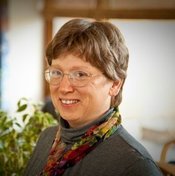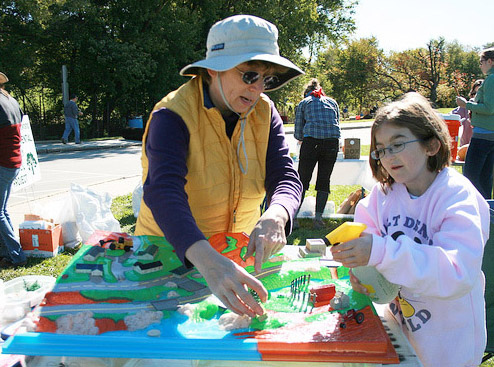|
Valerie Metzler's Inquiry of applied science learning |
Interview with Dottie BaumGarten

March 31, 2015, 3:00 PM

Dottie is a certified teacher and is an independent contractor for a couple schools and for the Philadelphia Water Department and educates students in the greater Philadelphia area about sustainability, watersheds and water usage, and gardens, environmental science and natural history.
It was a pleasure to meet her, observe her sustainable science class in the garden, and interview her about her opinions of teaching and her observations of student learning. Her students were all very interested in digging in the soil, identifying the plants that were still alive in the garden after the winter, turning compost, and collecting seeds that had fallen from a nearby tree, all while getting reacquainted with the garden!
It was a pleasure to meet her, observe her sustainable science class in the garden, and interview her about her opinions of teaching and her observations of student learning. Her students were all very interested in digging in the soil, identifying the plants that were still alive in the garden after the winter, turning compost, and collecting seeds that had fallen from a nearby tree, all while getting reacquainted with the garden!

How do students behave differently outside versus inside the classroom?
-Distracted, but more engaged with the material. Inside, students need more direction, and need more encouraging to engage with things.
-Outside students are asking questions, engaging on their own.
-Dottie said that in terms of science knowledge at the Montessori school, students don’t need her since the program is so rigorous. However, “By being with me (Dottie) they can apply it [their knowledge] outside”
How do you connect science practices in your curriculum?
-With the elementary level, she gets students to observe, experience phenomena and also identifying plants, concepts, etc. Students also compare their observations and she incorporates journaling with their activities.
“Science practices are infused with what we’re doing”
-More specifically, she had students observe various bird nests and drew the birds using ID guides along with their nests and compared and contrasted the nests.
-Invasive vs. Native species- looking at how invasive species ‘behave’
-Distracted, but more engaged with the material. Inside, students need more direction, and need more encouraging to engage with things.
-Outside students are asking questions, engaging on their own.
-Dottie said that in terms of science knowledge at the Montessori school, students don’t need her since the program is so rigorous. However, “By being with me (Dottie) they can apply it [their knowledge] outside”
How do you connect science practices in your curriculum?
-With the elementary level, she gets students to observe, experience phenomena and also identifying plants, concepts, etc. Students also compare their observations and she incorporates journaling with their activities.
“Science practices are infused with what we’re doing”
-More specifically, she had students observe various bird nests and drew the birds using ID guides along with their nests and compared and contrasted the nests.
-Invasive vs. Native species- looking at how invasive species ‘behave’
How do you believe it benefits students to apply science knowledge?
-“If they can’t do it they have no clue.” “Have to be able to do it outside.”
-She emphasized the importance of educating students about societal problems related to the environment.
How do you see outdoor/hands-on learning being incorporated into public school settings with classrooms of 30 students?
-She encouraged the use of stations, rotating students around and doing different tasks, “using journals as a regular practice.”
-She suggested bringing students outside and having 15 observing and 15 working or having groups of 4 doing different tasks and ‘training up’ students to be able to do specific tasks.
-She emphasized the importance of scaffolding and training/modeling how to use tools, how to put tools away.
-Suggested splitting class into groups and having a writing task ready to go. Students should write down their task for the day on the paper as well as what he/she observed based on his/her writing level.
-Stressed the importance of having an organized plan and giving each student a clear task that they are prepared to do.
How do you reign in & utilize the energy outside?
-Make sure you give extra tasks, assign these to those who finish first.
-Identify problems, separate, give extra tasks to students with extra energy.
-Divide kids who don’t work well together or who goof off.
-Know who’s safe and who needs more guidance.
-Utilize energy, relax students with reading or writing.
-Use interests of students to get them to explore.
Has this school built any community connections?
-Yes and they need more!
-Parents’ businesses for donations, foods. Municipality = Upper Darby.
-Collaborating, cooperating with stormwater management with nearby soccer fields that are often flooded and discuss the management of water that flows into a local creek.
OTHER:
-She had an activity where she put different types of soil in different bins around the room. Students got to feel it, move it around and predict where the soils were from and what kinds they were, compare and contrast. (Some she mentioned were: pine needle compost, vegetable scrap compost, clay, etc.)
-Students IDed good, not so good ways school was being sustainable (or wasn’t)
-Kids here are engaged with their own learning
-Students interviewed various individuals at the school about the things they identified as ‘bad’
-i.e. Utility bills (for lights that stayed on), Housekeeping (was recycling being recycled?)
-Conducted interviews with maintenance staff, etc.
-“If they can’t do it they have no clue.” “Have to be able to do it outside.”
-She emphasized the importance of educating students about societal problems related to the environment.
How do you see outdoor/hands-on learning being incorporated into public school settings with classrooms of 30 students?
-She encouraged the use of stations, rotating students around and doing different tasks, “using journals as a regular practice.”
-She suggested bringing students outside and having 15 observing and 15 working or having groups of 4 doing different tasks and ‘training up’ students to be able to do specific tasks.
-She emphasized the importance of scaffolding and training/modeling how to use tools, how to put tools away.
-Suggested splitting class into groups and having a writing task ready to go. Students should write down their task for the day on the paper as well as what he/she observed based on his/her writing level.
-Stressed the importance of having an organized plan and giving each student a clear task that they are prepared to do.
How do you reign in & utilize the energy outside?
-Make sure you give extra tasks, assign these to those who finish first.
-Identify problems, separate, give extra tasks to students with extra energy.
-Divide kids who don’t work well together or who goof off.
-Know who’s safe and who needs more guidance.
-Utilize energy, relax students with reading or writing.
-Use interests of students to get them to explore.
Has this school built any community connections?
-Yes and they need more!
-Parents’ businesses for donations, foods. Municipality = Upper Darby.
-Collaborating, cooperating with stormwater management with nearby soccer fields that are often flooded and discuss the management of water that flows into a local creek.
OTHER:
-She had an activity where she put different types of soil in different bins around the room. Students got to feel it, move it around and predict where the soils were from and what kinds they were, compare and contrast. (Some she mentioned were: pine needle compost, vegetable scrap compost, clay, etc.)
-Students IDed good, not so good ways school was being sustainable (or wasn’t)
-Kids here are engaged with their own learning
-Students interviewed various individuals at the school about the things they identified as ‘bad’
-i.e. Utility bills (for lights that stayed on), Housekeeping (was recycling being recycled?)
-Conducted interviews with maintenance staff, etc.
